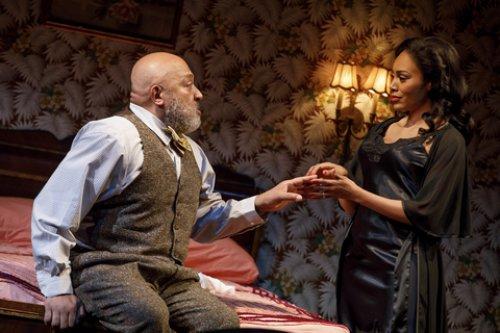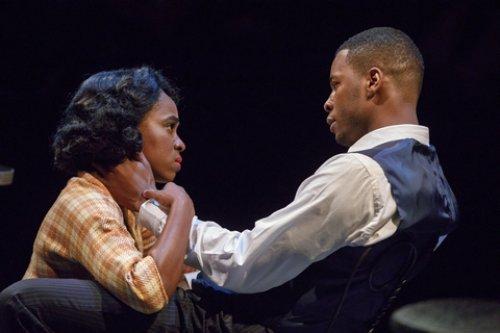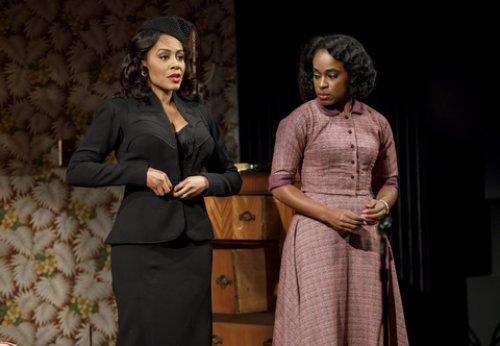Paradise Blue
A dark churning character study by Dominique (“Pipeline”) Morisseau set in 1949 Detroit jazz club that veers off into melodrama.

Francois Battiste, J. Alphonse Nicholson, Keith Randolph Smith and Kristolyn Lloyd in a scene from Dominique Morisseau’s “Paradise Blue” at The Pershing Square Signature Center (Photo credit: Joan Marcus)
[avatar user=”Joel Benjamin” size=”96″ align=”left” ] Joel Benjamin, Critic[/avatar]In many ways Dominique Morisseau’s Paradise Blue shares similarities with August Wilson’s brilliant, if long-winded, Pittsburgh based plays. Blue is part of Morisseau’s Detroit Project, a three-play cycle that takes place in three different eras. Blue, developed with the aid of the Williamstown Theatre Festival, the Public Theater and the McCarter Theatre, is a snapshot of desperate people occupying a part of Detroit on the verge of vast changes—read gentrification.
Morisseau’s characters, unfortunately, aren’t quite as well rounded as Wilson’s and her injudicious inclusion of an over-the-top melodramatic ending turns a dark character study—not without its charms—into something ludicrous.

Keith Randolph Smith and Simone Missick in a scene from Dominique Morisseau’s “Paradise Blue” at The Pershing Square Signature Center (Photo credit: Joan Marcus)
Within Blue’s (J. Alphonse Nicholson) Paradise Club—brought imaginatively to life in Neil Patel’s impeccably detailed set—five characters wander about spouting their narratives and life views (à la O’Neill’s Iceman Cometh). That the Paradise Club appears to have only one actual customer, Silver (Simone Missick) explains the dreary ambiance communicated by the space, helped by Kenny Rampton’s original atmospheric musical score. Blue is thirty-ish, handsome and a keenly talented trumpeter on the verge of having to make life-changing choices.
Unadorned, but lovely Pumpkin, the loyal-to-a-fault maid/waitress/bartender is in love with Blue whose seeming indifference to her turns into something ominous, as played with thorough misty-eyed passivity by Kristolyn Lloyd. She is the quiet center of the emotional storm that erupts with ferocity.

Alphonse Nicholson and Kristolyn Lloyd in a scene from Dominique Morisseau’s “Paradise Blue” at The Pershing Square Signature Center (Photo credit: Joan Marcus)
Her position as head female and chief emotional support at the Paradise Club is challenged by Silver who is written and directed to act like Jackée Harry of the TV series 227, her voice molten honey and her walk—exaggerated by Rui Rita’s luscious lighting—a savory caricature of femininity. She enters flirtatiously boasting of her conquests and her wad of cash to occupy a room upstairs from the bar. Her seductive disruption of the status quo puts Pumpkin on alert.
Completing the cast are two members of Blue’s jazz band (whose future is in doubt): Corn, the middle-aged pianist and guru of the group played with substance and guts by Keith Randolph Smith and P-Sam (aka Percussion Sam), the fidgety, angry, needy challenger to Blue’s dominance. Francois Battiste’s P-Sam is a tiny volcano about to erupt.

Simone Missick and Kristolyn Lloyd in a scene from Dominique Morisseau’s “Paradise Blue” at The Pershing Square Signature Center (Photo credit: Joan Marcus)
There is much that is left unsaid between Morisseau’s period-perfect lines. The talented cast, directed by the experienced, sharp-eyed/eared Ruben Santiago-Hudson, expertly fills in these blanks with naturalness and energy, even if these qualities can’t quite make sense of the last volatile moments of Paradise Blue.
Paradise Blue (through June 17, 2018)
The Signature Theatre
The Pershing Square Signature Center, 480 West 42nd Street, in Manhattan
For tickets, call 212-244-7529 or visit http://www.signaturetheatre.org
Running time: two hours and 35 minutes including one intermission






Leave a comment